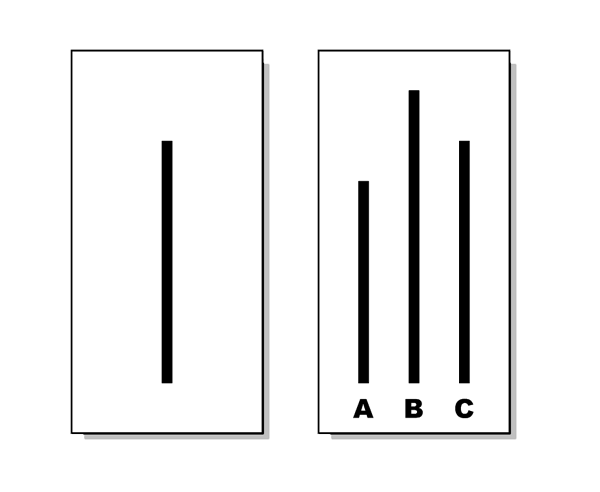The Asch Experiment and Rhetoric by Aristotle
I've only just begun reading Rhetoric by Aristotle, but one of the early lines reminded me of the Asch Experiment.
Aristotle says in Rhetoric:

...before some audiences not even the possession of the exactest knowledge will make it easy for what we say to produce conviction
Aristotle says there are people who can be shown the exact truth, yet still not believe it. In modern times, we
have invented half a dozen concepts to explain this observation by Aristotle. We have the term Cognitive Dissonance.
There's also the common doubling down effect, whereby a person will become even more entrenched in his beliefs in
response to evidence against them. We use peer pressure to explain this. There are a lot of experiments covering
such concepts, and the Asch Experiment is one of the most absurd.
The Asch Experiment

In that experiment, the test subjects were told they were a part of a simple vision test. They were placed in a
room with other people who were part of the study; the test subjects themselves believed these people were also part
of the vision test.
The group was shown the photograph above and asked to state which of the lines on the right was the same length as
the one on the left. Although the answer is obvious, the test subjects did not always give the right answer. The
other "participants" in the study would say an incorrect answer and agree to it. When it came time for the test
subject to give his answer, he had heard all of the other "participants" state the incorrect answer. Instead of
going with the obviously correct result he could see with his eyes, the test subject would choose to instead agree
with the group.
Conformity or Persuasion?
The study was considered a test of conformity. I don't think the results are too surprising. Almost 2400 years ago,
Aristotle had already acknowledged results of the Asch Experiment. But Aristotle didn't just stop at acknowledging
it. He set out to study how to solve it.
While most people consider this experiment to be a study of conformity, it is actually a study of persuasion. The
test subjects were persuaded by group consensus. The test subjects fell into the category of audience who could not
even be presented with the "exactest knowledge" and reach the right conclusion. Aristotle's goal was to find ways to
help these people reach the right conclusion. He blames not the test subject, but the experimenters:
Rhetoric is useful (1) because things that are true and things that are just have a natural tendency to prevail over their opposites, so that if the decisions of judges are not what they ought to be, the defeat must be due to the speakers themselves, and they must be blamed accordingly.The experiment was a trap for the test subject. Indeed, the speakers are to blame for why the true participant chose the false answer. They set out to persuade him incorrectly. Aristotle also warns of the tremendous harm that can be done to the world if the powers of Rhetoric were used to dissuade from the truth.
Aristotle's Noble Intentions vs Modern Scientists
It's interesting to note that this Asch Experiment isn't really being taught as a study in the power of evil
persuasion. Instead, it's taught as a problem for you, the test subject, to solve. You must look inside yourself and
stop conforming! Never mind the evil scientists trying to persuade you to believe in falsehoods.
The real Asch Experiment is recognizing it for what it is: the truth being presented isn't the card with the lines,
it's the scientist's intention to corrupt a test subject. To pass the Asch Experiment, you don't have to say which
line matches the others; you have to say that the experiment itself was a demonstration in coercive control.
Aristotle wasn't focused on how to persuade people to believe the untrue; he was focused on how to persuade people
"...whom one cannot instruct." He wanted to find ways to help the test subject reach the right conclusion, not the
wrong one. He understood the great harm that can be done if persuasive tools were used with bad intention.
And if it be objected that one who uses such power of speech unjustly might do great harm, that is a charge which may be made in common against all good things except virtue, and above all against the things that are most useful, as strength, health, wealth, generalship. A man can confer the greatest of benefits by a right use of these, and inflict the greatest of injuries by using them wrongly.
Comments:
Leave a Comment
Submit

